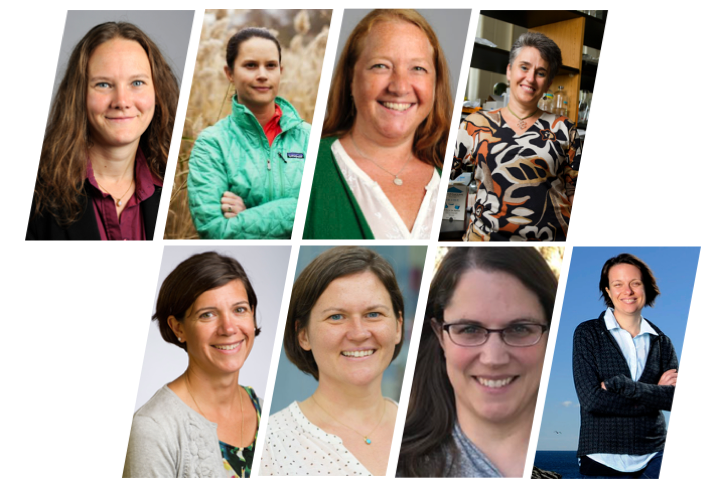In case you missed it, here was part one of our series.
Building Knowledge and Pathways to Positive Change
Women make up less than a third of the global research population, but scientists at Northeastern University’s Department of Marine and Environmental Sciences are driving the change in that statistic through their innovative, successful research and their contributions to a thriving STEM pipeline for young women and future researchers. This Women’s History Month, we’re highlighting faculty who are advancing scientific knowledge and removing barriers for the next generation of women in STEM.
How do human activities alter the structure and function of microbial communities, and how can microbial communities ameliorate anthropogenic pollution?
Featuring Dr. Jennifer Bowen

“The most rewarding part of being a mentor to me is in cultivating my student’s intellectual curiosity and watching them build the self-reliance and expertise they need to be successful.” – Dr. Jennifer Bowen
Dr. Jennifer Bowen and her research team seek answers to these questions, and the marshlands of the greater Boston area are an ideal landscape to find the answers. Dr. Bowen’s work with a long-term nutrient enrichment experiment at the Plum Island Long-Term Ecological Research site North of Boston looks at the impact of coastal eutrophication on salt marsh ecosystem sustainability, and her work at Revere’s Rumney Marsh and other restored marshes in the region quantifies how these restorations alter the capacity for marshes to remove land-derived nitrogen.
In one recent study, Dr. Bowen and Dr. Ashley Bulesco, then Bowen Lab PhD candidate and now faculty at Eckard College, determined that nitrate enrichment in coastal systems is stimulating a shift in the microbial community and an increase of microbes responsible for decomposition. Given the essential ecosystem services provided by salt marshes, particularly their potential for carbon storage and natural nutrient filtration, the ongoing research by Dr. Bowen and her lab is providing critical information for scientists and resource managers seeking to prepare for the impacts of climate change.
Dr. Bowen’s early experiences with nature on her family’s farm in rural Maine played an important role in her path to becoming a scientist and educator: “Observing nature, drawing connections between seemingly disparate ideas, and learning to problem solve help me be a successful scientist.” She has consistently worked to bring these skills to her own students, and to make complex research more accessible to non-academic audiences. She translated her recent Nature Communications study analyzing microbial communities of the invasive Phragmites grass into a piece for the Environmental Science Journal for Teens, and her lab group translated their nutrient cycling research into fun educational activities for high school students attending last summer’s Coastal Ocean Science Academy at MSC.
How will the inhabitants of marine ecosystems, namely fish, respond to pollutants – and how can we share this science with the next generation of ocean stewards?
Featuring Dr. Tara Duffy

“I often reflect back on the factors that sparked by interest in science and what has allowed me to be successful. It comes down to my fortunate interactions with curious, inspirational, and supportive mentors – both male and female. I try to offer to my students what these meaningful scientists in my life have given to me.” – Dr. Tara Duffy
Dr. Tara Duffy is interested in the molecular, individual, and population responses of fish and other marine animals to various pollutants, and what these responses can tell us about the ecological and evolutionary challenges they face. A 2016 study by Dr. Duffy and collaborators examined bay anchovy, an ecologically important forage species in Gulf of Mexico estuaries. The bay anchovy has a protracted spawning season and small eggs and larvae that likely encountered oil and dispersants during the Deepwater Horizon oil spill. They determined that bay anchovy larvae are sensitive to oil pollution and that this species could be important for understanding population level impacts in the system.
Dr. Duffy brings her research experience and her passion for teaching students to communicate science into the classroom, leading impactful courses at Northeastern in marine biology, zoology, evolution, and food security and sustainability. Her Dialogues course introduced students to food systems and conservation biology in Greece and Romania.
She also goes beyond the classroom to connect students to the science and each other, collaborating with others on the MES Diversity & Inclusion team to pioneer peer mentoring and inclusiveness initiatives. Dr. Duffy also serves as the Faculty Head for the Three Seas Program, teaching Marine Invertebrate Zoology and Botany to prepare graduate and undergraduate students for inquiry-based and experiential curriculum. Dr. Duffy and the Three Seas team provide students with opportunities to do hands-on marine science at world-renowned research facilities, bringing the science happening in the field and lab directly to the future stewards of marine science and conservation.

